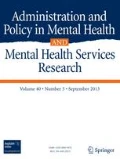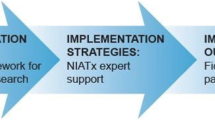Abstract
Despite increased awareness of the benefits of integrated services for persons with co-occurring substance use and psychiatric disorders, estimates of the availability of integrated services vary widely. The present study utilized standardized measures of program capacity to address co-occurring disorders, the dual diagnosis capability in addiction treatment and dual diagnosis capability in mental health treatment indexes, and sampled 256 programs across the United States. Approximately 18 % of addiction treatment and 9 % of mental health programs met criteria for dual diagnosis capable services. This is the first report on public access to integrated services using objective measures.

Similar content being viewed by others
References
Becker, D. R., Drake, R. E., Bond, G. R., Nawaz, S., Haslett, W. R., & Martinez, R. A. (2011). A national mental health learning collaborative on supported employment. Psychiatric Services, 62, 704–706.
Bond, G. R., Evans, L., Salyers, M. P., Williams, J., & Kim, H. W. (2000). Measurement of fidelity in psychiatric rehabilitation. Mental Health Services Research, 2(2), 75–87.
Brown, J. L., & Comaty, J. (2007, October). Statewide utilization of the DDCAT: Reliability & Feasability. Paper presented at the Addiction Health Services Research Annual Meeting, Athens, GA.
Brunette, M. F., Asher, D., Whitley, R., Lutz, W. J., Wieder, B. L., Jones, A. M., et al. (2008). Implementation of integrated dual disorders treatment: A qualitative analysis of facilitators and barriers. Psychiatric Services, 59(9), 989–995. doi:10.1176/appi.ps.59.9.989.
Center for Substance Abuse Treatment (CSAT). (2005). Substance abuse treatment for persons with co-occurring disorders, treatment improvement protocol (TIP) series 42. (DHHS publication No. SMA-05-3992). Substance Abuse and Mental Health Services Administration, Rockville, MD.
Claus, R. (2010, June). The DDCAT and DDCMHT: Building a framework to guide co-occurring implementation. Paper presented at the 6th National COSIG Grantee Meeting, Bethesda, MD.
Drake, R. E., Essock, S. M., Shaner, A., Carey, K. B., Minkoff, K., Kola, L., et al. (2001). Implementing dual diagnosis services for clients with severe mental illness. Psychiatric Services, 52(4), 469–476. doi:10.1176/appi.ps.52.4.469.
Ducharme, L., Knudsen, H., & Roman, P. (2006). Availability of integrated care for co-occurring substance abuse and psychiatric conditions. Community Mental Health Journal, 42(4), 363–375.
Ducharme, L., Mello, H., Roman, P., Knudsen, H., & Johnson, J. (2007). Service delivery in substance abuse treatment: Reexamining comprehensive care. The Journal of Behavioral Health Services & Research, 34(2), 121–136.
Giard, J., Kincaid, R., Gotham, H. J., Claus, R., Lambert-Harris, C., McGovern, M. P., … Brown, J. L. (2011). The dual diagnosis capability in addiction treatment (DDCAT) toolkit. Retrieved December 21, 2011, from http://www.samhsa.gov/co-occurring/ddcat/.
Gil-Rivas, V., & Grella, C. E. (2005). Addictions services treatment services and service delivery models for dually diagnosed clients: Variations across mental health and substance abuse providers. Community Mental Health Journal, 41(3), 251–266.
Gotham, H. J., Brown, J. L., Comaty, J., & McGovern, M. P. (2008). The dual diagnosis capability in mental health treatment (DDCMHT) index version 3.2. Kansas City, MO: Mid-American Addiction Technology Transfer Center.
Gotham, H. J., Brown, J. L., Comaty, J. E., McGovern, M. P., & Claus, R. E. (2009, October). The dual diagnosis capability in mental health treatment (DDCMHT) index. Paper presented at Addiction Health Services Research Annual Meeting, San Francisco, CA.
Gotham, H. J., Claus, R., Giard, J., Kincaid, R., Lambert-Harris, C., McGovern, M. P., … Brown, J. L. (2011). The dual diagnosis capability in mental health treatment (DDCMHT) toolkit. Retrieved December 21, 2011, from http://www.samhsa.gov/co-occurring/ddcmht/.
Gotham, H. J., Claus, R. E., Selig, K., & Homer, A. L. (2010). Increasing program capability to provide treatment for co-occurring substance use and mental disorders: Organizational characteristics. Journal of Substance Abuse Treatment, 38(2), 160–169. doi:10.1016/j.jsat.2009.07.005.
Gotham, H., Haden, A., & Owens, C. (2004, July). Report on the 2004 annual visits to COSIG sites. Missouri institute of mental health. Presented to the Governor’s steering committee on co-occurring mental illness and substance use disorders, MO.
Hart, L. G., Larson, E. H., & Lishner, D. M. (2005). Rural definitions for health policy and research. American Journal of Public Health, 95(7), 1149–1155. doi:10.2105/AJPH.2004.042432.
SPSS, Inc. (2008). SPSS 17.0 for Windows. Chicago, IL.
Institute for Healthcare Improvement. (2003). The breakthrough series: IHI’s collaborative model for achieving breakthrough improvement. Cambridge, MA: Institute for Healthcare Improvement.
Kehoe, T., Rehm, J., & Chatterji, S. (2007). Global burden of alcohol use disorders in year 2004. Report prepared for World Health Organization. Zurich: World Health Organization.
Knudsen, H. K., Roman, P. M., & Ducharme, L. J. (2004). The availability of psychiatric programs in private substance abuse treatment centers, 1995 to 2001. Psychiatric Services, 55(3), 270–273. doi:10.1176/appi.ps.55.3.270.
Lee, N., & Cameron, J. (2009). Differences in self and independent ratings on an organisational dual diagnosis capacity measure. Drug and Alcohol Review, 28(6), 682–684.
Mangrum, L. (2007, October). Dual diagnosis capability in addiction treatment: A comparison of client characteristics and treatment outcomes. Paper presented at the Addiction Health Services Research Annual Meeting, Athens, GA.
Mangrum, L. F., Spence, R. T., & Lopez, M. (2006). Integrated versus parallel treatment of co-occurring psychiatric and substance use disorders. Journal of Substance Abuse Treatment, 30(1), 79–84.
McGovern, M. P., & Carroll, K. M. (2003). Evidence-based practices for substance use disorders. Psychiatric Clinics of North America. Special Issue: Evidence-Based Practices in Mental Health Care, 26(4), 991–1010. doi:10.1016/S0193-953X(03)00073-X.
McGovern, M. P., Drake, R. E., Merrens, M., Mueser, K. T., & Brunette, M. F. (2008). Clinical administrator’s guidebook: Integrated services for substance use and mental health disorders. Center City, MN: Hazelden Foundation.
McGovern, M. P., & Giard, J. (2007, October). Services research on co-occurring disorders: Applications of the dual diagnosis capability in addiction treatment (DDCAT) index. Paper presented at the Addiction Health Services Research Annual Meeting, Athens, GA.
McGovern, M. P., Lambert-Harris, C., McHugo, G. J., Giard, J., & Mangrum, L. (2010). Improving the dual diagnosis capability of addiction and mental health treatment services: Implementation factors associated with program level changes. Journal of Dual Diagnosis, 6, 237–250.
McGovern, M. P., Matzkin, A. L., & Giard, J. (2007a). Assessing the dual diagnosis capability of addiction treatment services: The dual diagnosis capability in addiction treatment (DDCAT) index. Journal of Dual Diagnosis, 3, 111–123.
McGovern, M. P., & McLellan, A. T. (2008). The status of addiction treatment research with co-occurring substance use and psychiatric disorders. Journal of Substance Abuse Treatment, 34(1), 1–2. doi:10.1016/j.jsat.2007.03.007.
McGovern, M. P., Xie, H., Acquilano, S., Segal, S. R., Siembab, L., & Drake, R. E. (2007b). Addiction treatment services and co-occurring disorders: The ASAM-PPC-2R taxonomy of program dual diagnosis capability. Journal of Addictive Diseases, 26(3), 27–37.
McGovern, M. P., Xie, H., Segal, S. R., Siembab, L., & Drake, R. E. (2006). Addiction treatment services and co-occurring disorders: Prevalence estimates, treatment practices, and barriers. Journal of Substance Abuse Treatment, 31(3), 267–275.
Minkoff, K., & Cline, C. A. (2004). Changing the world: The design and implementation of comprehensive continuous integrated systems of care for individuals with co-occurring disorders. Psychiatric Clinics of North America, 27(4), 727–743.
Mojtabai, R. (2004). Which substance abuse treatment facilities offer dual diagnosis programs? American Journal of Drug and Alcohol Abuse, 30(3), 525–536. doi:10.1081/ADA-200032281.
Mueser, K. T., Noordsy, D. L., Drake, R. E., Fox, L., & Barlow, D. H. (2003). Integrated treatment for dual disorders: A guide to effective practice. New York, NY, US: Guilford Press.
New Freedom Commission on Mental Health. (2003). Achieving the promise: Transforming mental health care in America. (DHHS publication No. SMA-03-3832). Rockville, MD.
O’Brien, C. P., Charney, D. S., Lewis, L., Cornish, J. W., Post, R. M., Woody, G. E., et al. (2004). Priority actions to improve the care of persons with co-occurring substance abuse and other mental disorders: A call to action. Biological Psychiatry, 56(10), 703–713.
Sacks, S., Chandler, R., & Gonzales, J. (2008). Responding to the challenge of co-occurring disorders: Suggestions for future research. Journal of Substance Abuse Treatment, 34(1), 139–146.
Stilen, P., & Baehni, S. A. (2002, 4th edition). Collaborative response: Addressing the needs of consumers with co-occurring substance use and mental health disorders. Kansas City, MO: Mid-America Addiction Technology Transfer Center.
Substance Abuse and Mental Health Services Administration. (2002). Report to congress on the prevention and treatment of co-occurring substance abuse disorders and mental disorders. (November edition). Rockville, MD: SAMHSA, U.S. Department of Health and Human Services.
Substance Abuse and Mental Health Services Administration. (2003). Strategies for developing treatment programs for people with co-occurring substance abuse and mental disorders. (No. 3782). Rockville, MD: SAMHSA, U.S. Department of Health and Human Services.
Substance Abuse and Mental Health Services Administration. (2007). Results from the 2006 National survey on drug use and health: National findings. (NSDUH Series, H-32, HHS Publication No. SMA-07-4293). Rockville, MD: Office of Applied Studies.
Substance Abuse and Mental Health Services Administration. (2010). Results from the 2009 National survey on drug use and health: Mental health findings. Rockville, MD: Center for Behavioral Health Statistics and Quality.
Timko, C., Dixon, K., & Moos, R. (2005). Treatment for dual diagnosis patients in the psychiatric and substance abuse systems. Mental Health Services Research, 7(4), 229–242.
Vannoy, S. D., Mauer, B., Kern, J., Girn, K., Ingoglia, C., Campbell, J., et al. (2011). A learning collaborative of CMHCs and CHCs to support integration of behavioral health, and general medical care. Psychiatric Services, 62, 753–758.
Watkins, K. E., Hunter, S. B., Wenzel, S. L., Tu, W., Paddock, S. M., Griffin, A., et al. (2004). Prevalence and characteristics of clients with co-occurring disorders in outpatient substance abuse treatment. American Journal of Drug and Alcohol Abuse, 30(4), 749–764. doi:10.1081/ADA-200037538.
Westfall, P. H., Tobias, R. D., & Wolfinger, R. D. (2011). Multiple comparisons and multiple tests using SAS. Gary, NC: SAS Publishing, SAS Institute Inc.
World Health Organization. (2003). Investing in mental health. Geneva: World Health Organization.
World Health Organization. (2008). The global burden of disease: 2004 update. Geneva: World Health Organization.
World Health Organization. (2009). Global health risks mortality and burden of disease attributable to selected major risks. Geneva: World Health Organization.
Acknowledgments
This research was supported by The Robert Wood Johnson Foundation Substance Abuse Policy Research Program (#63110) and by the Substance Abuse and Mental Health Services Administration Co-Occurring Disorder Implementation and Innovation (#8732). The authors are grateful to the states, tribes and other organizations participating in the DDCAT/DDCMHT/DDCHCS Learning Collaborative, as well as the treatment providers and patients in the community programs. The data reported in this manuscript were presented at the annual meeting of the American Psychiatric Association, Philadelphia, PA, on May 7th, 2012.
Author information
Authors and Affiliations
Corresponding author
Rights and permissions
About this article
Cite this article
McGovern, M.P., Lambert-Harris, C., Gotham, H.J. et al. Dual Diagnosis Capability in Mental Health and Addiction Treatment Services: An Assessment of Programs Across Multiple State Systems. Adm Policy Ment Health 41, 205–214 (2014). https://doi.org/10.1007/s10488-012-0449-1
Published:
Issue Date:
DOI: https://doi.org/10.1007/s10488-012-0449-1




